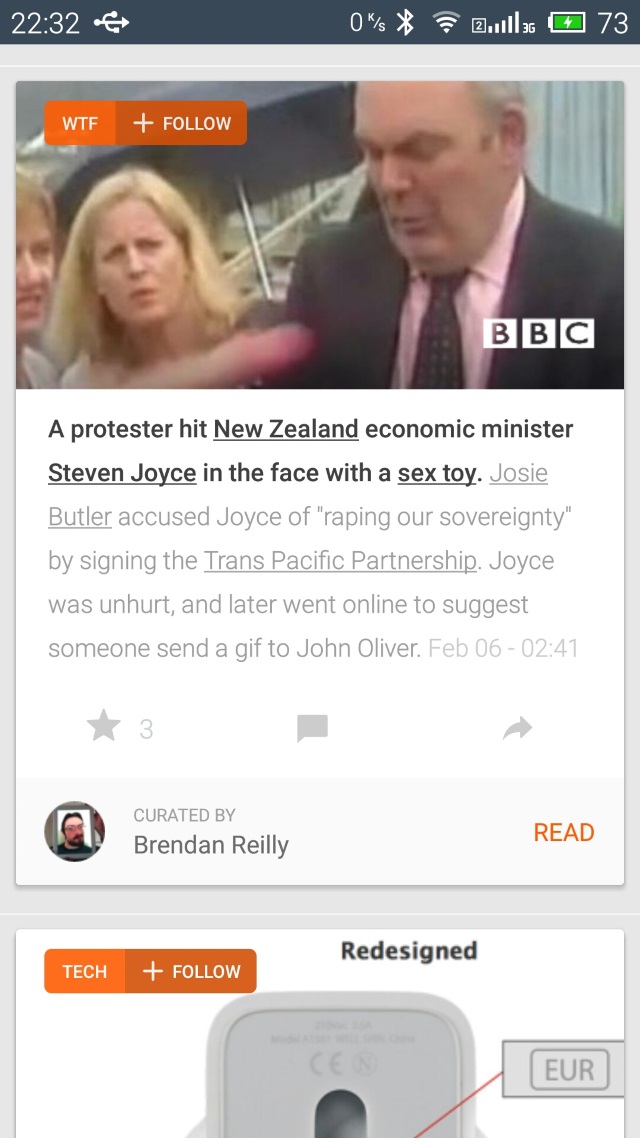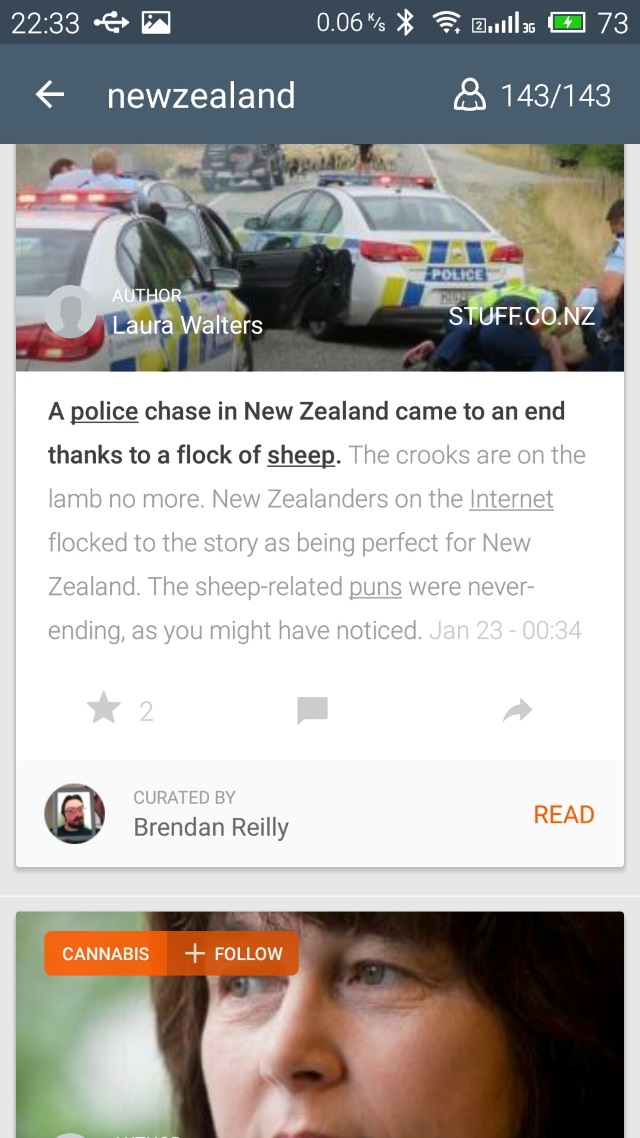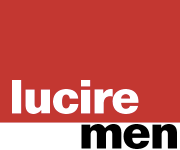I’ve just switched from Inside, the much vaunted news app from entrepreneur Jason Calacanis, to Wildcard as my principal news app on my phone. I never got to use Circa (which I understand Jason was also behind), which sounded excellent: by the time I downloaded it, they had given up.
But we all need news, and I don’t like the idea of apps that are from a single media organization.
Inside seemed like a good idea, and I even got round to submitting news items myself. The idea is that the items there are curated by users, shared via the app. There was a bit of spam, but the legit stuff outnumbered it.
However, I can’t understand the choices these days. A few items I put in from Radio New Zealand, Māori Television and The New Zealand Herald were fine—stories about the flag and the passing of Dr Ranginui Walker, for instance—but none of the ones about the passing of Martin Crowe, possibly of more international interest, remained.
There were other curious things: anything from Autocar is summarily rejected (they don’t even appear) while I notice Jalopnik is fine. When it comes to cars, this is the only place where the publication with the longest history in the sector is outranked by a web-only start-up, whose pieces are enjoyable but not always accurate. The only car piece it accepted from me was about Tesla selling in Indiana, but Renault, Volkswagen, Lamborghini, Porsche, Aston Martin and other manufacturers’ news didn’t make it. This I don’t get. And I like to think I know a little bit about cars, in the week when Autocade hit 8,000,000 page views.
Now, if this is meant to be an international app, downloadable by everyone, then it should permit those of us in our own countries to have greater say in what is relevant to our compatriots.
Visit the New Zealand category, and you see a few items from yours truly, but then after that, they are few and far between: the Steven Joyce dildo incident, for example, and you don’t have to scroll much to see the Otago car chase being stopped by sheep last January. A bit more has happened than these events, thank you. No wonder Americans think nothing happens here.


According to Inside, these news items—separated only by one about Apple issuing a recall in our part of the world—are far more important to users following the New Zealand category than Martin Crowe’s death.
The UK is only slightly better off, but not by much. I notice my submission about Facebook not getting away with avoiding taxes in the UK vanished overnight, too.
News of the royal baby in Sweden wasn’t welcome just now. Nor was the news about the return of one of the Hong Kong booksellers, but news from Bloomberg of a luxury home on the Peak, which I submitted last month, was OK. Lula’s questioning by police has also disappeared (admittedly my one was breaking news, and very short), though Inside does have a later one about his brief arrest.
Yet to locals, the rejected ones are important, more important than Gladys Knight singing to a cop or a knife on O. J. Simpson’s estate (which have made it).
This is a very American app, and that’s fine: it’s made by a US company, and I’m willing to bet most of its users are American. However, the “all” feed, in my view, should be global; those who want news tailored to them already have the choice of selecting their own topics. (It’s the first thing the app gets you to do after signing in.) And if some fellow in New Zealand wants to submit, then he should have the same capacity as someone in the US. After all, there are more of them than there are of us, and I hardly think my contributions (which now keep vanishing!) will upset the status quo.
Or does it?
I mean, I have posted the odd thing from The Intercept about their country’s elections.
Whatever the case, I think it’s very odd for an app in the second decade of the century to be so wedded to being geocentric. I can understand getting stuff weeded out for quality concerns—I admit I’ve posted the odd item that is an op-ed rather than hard news—but this obsession to be local, not global, reinforces some false and outdated stereotypes about the US.
It’s like Facebook not knowing that time zones outside US Pacific Time exist and believing its 750 million (as it then was) users all lived there.
My advice to app developers is: if you don’t intend your work to be global, then don’t offer it to the global market. Don’t let me find your app on a Chinese app centre. Say that it’s for your country only and let it be.
Or, at least be transparent about how your apps work, because I can’t find anything from Inside about its curation processes other than the utopian, idealistic PR that says we’re all welcome, and we all have a chance to share. (We do. Just our articles don’t stay on the feed for very long.)

Wildcard has an attractive user interface, and its mixture of news is more appealing, especially if you want more depth.
Admittedly, I’ve only been on Wildcard for less than a day but I’ve already found it more international in scope. It also has more interesting editorial items. It is still US-developed—east coast this time, instead of west coast—but it supplements its own news with what’s in your Twitter feed. It’s not as Twitter-heavy as Nuzzel, which I found too limited, but seems to give me a mixture of its own curation with those of my contacts. The user interface is nice, too.
I’m not writing off Inside altogether—if you’re after a US-based, US-centric news app, then it’s probably excellent, although I will leave that decision to its target market. I can hardly judge when dildos matter more to its users than the greatest cricket batsman in our country.
For me, Wildcard seems to be better balanced, it doesn’t make promises about public curation that it can’t keep, and I’ve already found myself spending far more time browsing its pieces than the relatively small amount that seem to remain on Inside. It is still a bit US-biased in these first 24 hours, probably because it hasn’t taken that much from my Twitter contacts yet. There seems to be more news on it and I’m getting a far better read, even of the US-relevant items. I’m looking forward to using it more: it just seems that much more 21st-century.—Jack Yan, Publisher
This piece originally appeared on Jack Yan’s blog.









Leave a Reply